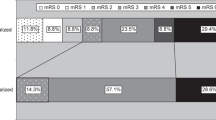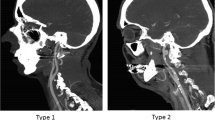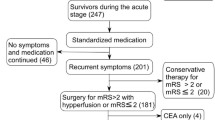Summary
Background and Purpose
New techniques have substantially raised recanalization rates of mechanical thrombectomy in acute ischemic stroke in the last few years with initial prospective trials reporting good neurological outcome in up to 58 % of the cases. However some recent reports questioning the benefit of endovascular therapy have initiated a discussion about the importance of patient-selection. The purpose of this study was to investigate whether an elongation of the carotid artery affects the angiographic outcome of the recanalization procedure in middle cerebral artery (MCA)-occlusions.
Materials and Methods
The data of 54 patients with occlusions of the M1-segment who underwent mechanical thrombectomy were included. The lengths of the carotid arteries were measured using preinterventional computed tomography (CT)-angiograms. To take individual patient’s height into account these lengths were divided by the length of the spine from the tip of the dens to the bottom of the th3 vertebral body (referred to as carotid-to-spine (CS)-Ratio). Angiographic results were scored according to the modified thrombolysis in cerebral infarction (mTICI)-score.
Results
Recanalization with mTICI ≥ 2b was achieved in 83.3 %. The mean CS-Ratio was 1.32 ± 0.13. There was a significant correlation between the CS-Ratio and the age of the patients. There were no significant differences in the CS-Ratios of occlusions that were successfully recanalized and those that were not. Neither were there significant correlations of the CS-Ratio and the length of procedure or the number of deployments of the stentretrievers.
Conclusion
In this retrospective analysis we report that carotid elongation does not affect angiographic results of mechanical thrombectomy in acute stroke.


Similar content being viewed by others
References
Saver JL, Jahan R, Levy EI, Jovin TG, Baxter B, Nogueira RG, Clark W, Budzik R, Zaidat OO; SWIFT Trialists. Solitaire flow restoration device versus the Merci Retriever in patients with acute ischaemic stroke (SWIFT): a randomised, parallel-group, non-inferiority trial. Lancet. 2012;380:1241–9.
Nogueira RG, Lutsep HL, Gupta R, Jovin TG, Albers GW, Walker GA, Liebeskind DS, Smith WS; TREVO 2 Trialists. Trevo versus Merci retrievers for thrombectomy revascularisation of large vessel occlusions in acute ischaemic stroke (TREVO 2): a randomised trial. Lancet. 2012;380:1231–40.
Jansen O, Macho JM, Killer-Oberpfalzer M, Liebeskind D, Wahlgren N. Neurothrombectomy for the treatment of acute ischemic stroke: results from the TREVO study. Cerebrovasc Dis. 2013;36:218–25.
Pereira VM, Gralla J, Davalos A, Bonafé A, Castaño C, Chapot R, Liebeskind DS, Nogueira RG, Arnold M, Sztajzel R, Liebig T, Goyal M, Besselmann M, Moreno A, Schroth G. Prospective, multicenter, single-arm study of mechanical thrombectomy using solitaire flow restoration in acute ischemic stroke. Stroke. 2013;44:2802–7.
Ciccone A, Valvassori L, Nichelatti M, Sgoifo A, Ponzio M, Sterzi R, Boccardi E; SYNTHESIS Expansion Investigators. Endovascular treatment for acute ischemic stroke. N Engl J Med. 2013;368:904–13.
Broderick JP, Palesch YY, Demchuk AM, Yeatts SD, Khatri P, Hill MD, Jauch EC, Jovin TG, Yan B, Silver FL, von Kummer R, Molina CA, Demaerschalk BM, Budzik R, Clark WM, Zaidat OO, Malisch TW, Goyal M, Schonewille WJ, Mazighi M, Engelter ST, Anderson C, Spilker J, Carrozzella J, Ryckborst KJ, Janis LS, Martin RH, Foster LD, Tomsick TA; Interventional Management of Stroke (IMS) III Investigators. Endovascular therapy after intravenous t-PA versus t-PA alone for stroke. N Engl J Med. 2013;368:893–903.
Kidwell CS, Jahan R, Gornbein J, Alger JR, Nenov V, Ajani Z, Feng L, Meyer BC, Olson S, Schwamm LH, Yoo AJ, Marshall RS, Meyers PM, Yavagal DR, Wintermark M, Guzy J, Starkman S, Saver JL; MR RESCUE Investigators. A trial of imaging selection and endovascular treatment for ischemic stroke. N Engl J Med. 2013;368:914–23.
Pierot L, Gralla J, Cognard C, White P. Mechanical thrombectomy after IMS III, synthesis, and MR-RESCUE. AJNR Am J Neuroradiol. 2013;34:1671–3.
Pierot L, Söderman M, Bendszus M, White P, Muto M, Turjman F, Mangiafico S, Gralla J, Fiehler J, Szikora I, Cognard C. Statement of ESMINT and ESNR regarding recent trials evaluating the endovascular treatment at the acute stage of ischemic stroke. Neuroradiology. 2013 Nov;55(11):1313–8.
Soize S, Barbe C, Kadziolka K, Estrade L, Serre I, Pierot L. Predictive factors of outcome and hemorrhage after acute ischemic stroke treated by mechanical thrombectomy with a stent-retriever. Neuroradiology. 2013;55:977–87.
Khatri P, Abruzzo T, Yeatts SD, Nichols C, Broderick JP, Tomsick TA; IMS I and II Investigators. Good clinical outcome after ischemic stroke with successful revascularization is time-dependent. Neurology. 2009;73:1066–72.
Hassan AE, Chaudhry SA, Miley JT, Khatri R, Hassan SA, Suri MF, Qureshi AI. Microcatheter to recanalization (procedure time) predicts outcomes in endovascular treatment in patients with acute ischemic stroke: when do we stop? AJNR Am J Neuroradiol. 2013;34:354–9.
Rha JH, Saver JL. The impact of recanalization on ischemic stroke outcome: a meta-analysis. Stroke. 2007;38:967–73.
Nogueira RG, Liebeskind DS, Sung G, Duckwiler G, Smith WS; MERCI; Multi MERCI Writing Committee. Predictors of good clinical outcomes, mortality, and successful revascularization in patients with acute ischemic stroke undergoing thrombectomy: pooled analysis of the Mechanical Embolus Removal in Cerebral Ischemia (MERCI) and Multi MERCI Trials. Stroke. 2009;40:3777–83.
Faggioli G, Ferri M, Gargiulo M, Freyrie A, Fratesi F, Manzoli L, Stella A. Measurement and impact of proximal and distal tortuosity in carotid stenting procedures. J Vasc Surg. 2007;46:1119–24.
Lee TH, Choi CH, Park KP, Sung SM, Lee SW, Lee BH, Kim DH, Kim HJ, Kim CW, Kim S. Techniques for intracranial stent navigation in patients with tortuous vessels. AJNR Am J Neuroradiol. 2005;26:1375–80.
Tomsick T, Broderick J, Carrozella J, Khatri P, Hill M, Palesch Y, Khoury J; Interventional Management of Stroke II Investigators. Revascularization results in the interventional management of Stroke II trial. AJNR Am J Neuroradiol. 2008;29:582–7.
Yilmaz U, Roth C, Reith W, Papanagiotou P. Thrombus attenuation does not predict angiographic results of mechanical thrombectomy with stent retrievers. AJNR Am J Neuroradiol. 2013;34:2184–6.
Conclusions
In this retrospective analysis we report that carotid elongation does not affect angiographic results of mechanical thrombectomy in acute stroke and, therefore, should not be used as a criterion for patient-selection for endovascular treatment. Our results affirm that mechanical thrombectomy with stentretrievers is a method with stable angiographic results even in difficult anatomic conditions.
Conflict of Interest
We declare that we have no conflict of interest.
Author information
Authors and Affiliations
Corresponding author
Rights and permissions
About this article
Cite this article
Yilmaz, U., Mühl-Benninghaus, R., Simgen, A. et al. Carotid Elongation Does Not Affect Angiographic Results of Mechanical Thrombectomy in Acute Stroke. Clin Neuroradiol 26, 183–187 (2016). https://doi.org/10.1007/s00062-014-0345-z
Received:
Accepted:
Published:
Issue Date:
DOI: https://doi.org/10.1007/s00062-014-0345-z




